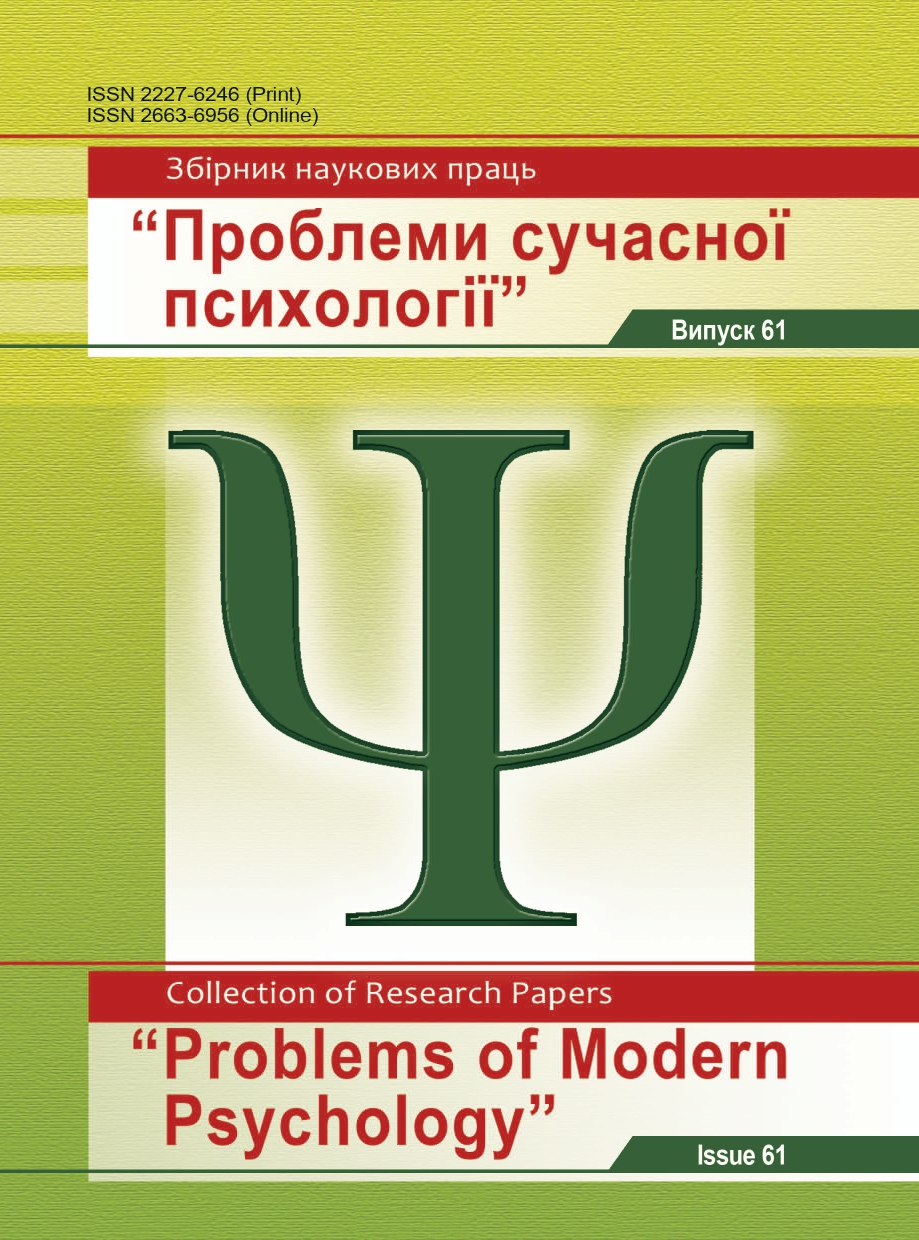Intelligence, Social and Emotional Intelligence: Correlation of Concepts in Modern Psychology
DOI:
https://doi.org/10.32626/2227-6246.2023-61.9-29Keywords:
intelligence, social intelligence, emotional intelligence, a set of non-cognitive abilities,, competencies, skills, management of other people’s emotions, the formation of social intelligence, subjects of dialogical interactionAbstract
The purpose of our article is to carry out an analysis of the author’s research on social intelligence according to Structural and Functional Approach; describe our researches of Social Intelligence; to propose own definition of “emotional intelligence”; to show the correlation of concepts “intelligence”, “social intelligence” and “emotional intelligence” in Modern Psychology.
Methods of the research. The following theoretical methods of the research were used to solve the tasks formulated in the article: the categorical method, structural and functional methods, the methods of the analysis, systematization, modeling and generalization.
The results of the research. We think, that social intelligence is a system of cognitive characteristics of the individual. It consists of three basic components: social-perceptive abilities, social imagination and social technique of communication. So, the effectiveness of subject-subject communication largely depends on the formation of social intelligence. Social intelligence is considered as a certain cognitive component of communicative competence, which is defined as the ability of the individual to accept the position, point of view of another person, to predict his/her behavior, to solve effectively various problems arising between subjects of dialogical interaction.
Conclusions. We believe that emotional intelligence is defined as a set of non-cognitive abilities, competencies or skills that affect a person’s ability to face challenges in the external environment, the emotional intelligence should be attributed to the empathic aspect of social intelligence. That is, we will consider emotional intelligence as a component of social intelligence. Let’s justify our own point of view. In this context, emotional intelligence is a set of general personality’s abilities, interconnected four skills, such as: awareness of one’s own emotions, the ability to determine what emotion the person feels at a given moment in time, to determine what basic emotions consists of this understanding; the ability to manage one’s own emotions (to change the intensity of emotions), to determine the source and the cause of their occurrence, the degree of usefulness; understanding other people’s emotions, determining emotional states by their verbal and non-verbal manifestations; management of other people’s emotions, providing purposeful action on emotions. At the same time, we’d like to make a generalization regarding the definition of emotional intelligence. Emotional intelligence, as we see, is the ability of an individual to perceive, evaluate and express emotions adequately; the individual’s ability to generate feelings when they contribute to thinking, to understand emotions and knowledge related to these emotions, the individual’s ability to regulate emotions, contributing to one’s own emotional and intellectual growth.
Downloads
Published
How to Cite
Issue
Section
License
Copyright (c) 2023 Ivashkevych Eduard, Spivak Vitalii

This work is licensed under a Creative Commons Attribution-NonCommercial 4.0 International License.
Copyright
The Editorial Board has the full right to publish original scientific papers containing results of theoretical and experimental research works which are not currently subject to review for publication in other scientific editions. The Author shall transfer to the editorial board of the Collection the right to spread the electronic version of the paper, as well as the electronic version of the paper translated into English (for papers originally submitted in Ukrainian and Russian) by all kinds of electronic means (placement at the official website of the Collection, electronic databases, repositories etc).
The Author of an article reserves the right to use materials of the paper, without approval with the editorial board and the founders of this Collection: a) partially or fully, for educational purposes; b) for writing own dissertation papers; c) for preparation of abstracts, conference reports and presentations.
The Author of an article can place electronic copies of the paper (including the final electronic version downloaded from the official website of the Collection) at:
- personal web resources of all Authors (websites, webpages, blogs etc.);
- web resources of the institutions where the Authors are employed (including electronic institutional repositories);
- non-profit public access web resources (for example, arXiv.org).
But in all cases, it is obligatory to have a bibliographic reference to the paper, or a hyperlink to its electronic copy placed at the official website of this Collection.






